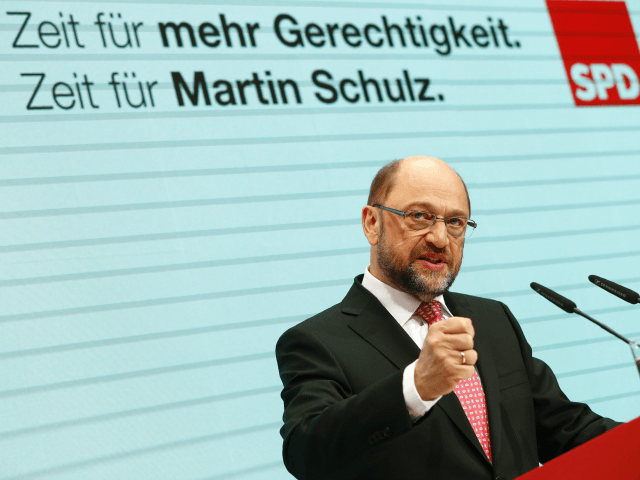BERLIN (AFP) – The leader of Germany’s Social Democrats, Martin Schulz, is seen beating Chancellor Angela Merkel in September elections according to several recent polls, thanks to an unapologetically leftist programme that has earned him accusations of veering toward populism.
After years of languishing in Merkel’s shadow, Germany’s traditional workers’ party is almost giddy with excitement these days, hoping their new leader can end the decade-long reign of the “queen of Europe”.
Schulz, the former president of the European Parliament, on Monday attacked a holy cow of his party, criticising the sweeping labour and social welfare reforms pushed through under former SPD chancellor Gerhard Schroeder between 2003 and 2005.
The so-called “Agenda 2010” reforms included lower social benefits and increased pressure on the unemployed to return to work.
They brought down unemployment — which in January stood at its lowest rate since the country’s 1990 reunification, at 5.9 percent — and gave a shot in the arm to an economy then labelled the “sick man of Europe”.
But they also widened the wealth gap and helped create millions of “working poor”, who often hold multiple part-time or contract jobs and struggle to pay the bills, a group sometimes called the “precariat”.
Many rank-and-file working-class SPD supporters have turned their backs on the party.
“We have also made mistakes,” Schulz told a meeting with trade unionists about the controversial reform package, adding: “the important thing is — when we recognise we have made mistakes, they have to be corrected”.
Schulz has promised to extend unemployment benefits for elderly jobless and the virtual elimination of open-ended temporary contracts in favour of fixed-term contracts.
– ‘Robin Hood’ –
Many see Schulz’s move as a frontal assault on the Schroeder reforms pushed through at the beginning of the century.
“The Robin Hood of the SPD”, ran a comment in business daily Handelsblatt. “Martin Schulz changes the course of the Social Democratic Party to the left”.
With these proposals, Schulz unashamedly shifts the SPD — the party more than 150 year old and now a junior partner in a “grand coalition” government with Merkel’s conservatives — to the left, more in line with Britain’s Labour Party under Jeremy Corbyn or the French Socialists under presidential hopeful Benoit Hamon.
Schulz has been applauded by the German far-left party Die Linke. It has signalled it is now far more open to entering a left-wing coalition with the SPD after the September election, which would likely also have to include the ecologist Greens party.
Criticism has rained down all the harder from the right. One of the leaders of Merkel’s Christian Democrats, Michael Fuchs, has accused Schulz of employing “social-populism”.
Finance Minister Wolfgang Schaeuble accused the SPD candidate of using “demagoguery” by depicting as catastrophic the situation of workers in Germany while making fiscally irresponsible promises.
– ‘Almost Trump’ –
“It’s almost word-for-word Trump,” Schaeuble told news weekly Der Spiegel in a recent interview, likening Schulz’s approach to that of the billionaire-reality TV star who won the White House.
Schulz entered the race against Merkel in late January with a built-in advantage over his predecessor as SPD chief, Sigmar Gabriel, who is now foreign minister.
Unlike Gabriel, Schulz was not part of Merkel’s grand coalition that has ruled since 2013 and can critique it from a distance.
A good speaker known for his muscular rhetoric, Schulz has managed to re-energise a party that spent years limping along in Merkel’s shadow.
The SPD long hovered around 20 percent in the polls, 15 percent behind Merkel’s CDU. The “Schulz effect” has pushed Germany’s two great traditional parties neck-and-neck again.
Schulz has been popular especially among young people, many now seen cheering at SPD events and wearing T-shirts with the Schulz slogan “MEGA” for “Make Europe Great Again”.
The newcomer can also count on a degree of voter fatigue with Merkel, who has been in power for over a decade, and has been weakened by the refugee crisis, which has boosted the nationalist and anti-immigration AfD.
With seven months still to go until the election, it is too early for predictions but most observers agree the race has just become more interesting.
A poll published Sunday by the Bild am Sonntag newspaper gave the SPD 33 percent support — one point ahead of Merkel’s party.

COMMENTS
Please let us know if you're having issues with commenting.